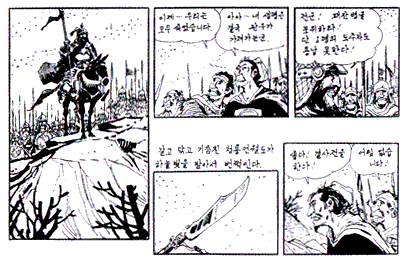Ko Woo-Young (高羽荣, also known as Go U-yeong) was one of the major manhwa artists active in South Korea during the 1970s and 1980s. Most of his works combine historical themes and local folk stories with his own satirical wit, such as 'Samgukji' ('Romance of the Three Kingdoms') and 'Iljimae' (1975-1977).
Early life and career
Ko Woo-Young was born in 1938 in Benxi, a city in the east of the Chinese Liaoning province, but at the time part of Manchuria and under Japanese control. He moved to Korea shortly after World War II. In Seoul he became acquainted with the art of comics and the works of Kim Yong Hwan, Kim Eui Hwan and Park Kwang Hyun in particular. Since his two brothers were already active as cartoonists at the time, he picked up drawing himself. He drew his first manhwa (comics) while being imprisoned during the Korean War. He decided to skip university and directly turn to cartooning while still a high school student. He used the pen name Pudong for his early works.
Artwork by Ko Woo-Young.
Im Keok-jeong
Woo-Young worked on pulp comics throughout most of the 1960s, but truly came to notice when he began making more personal works based on classical Korean and Chinese literature and folk stories for the daily newspaper Ilgan Sport in 1972. In January of that year, the paper began serialization of Ko Woo-Young's 'Im Keok-jeong'. It was the first South Korean comics serial based on actual historical events, and heralded in a new wave of adult-oriented manhwa.
Samgukji
Woo-Young's best-known series was 'Samgukji', which was based on the beloved 14th-century historical novel 'Romance of the Three Kingdoms' by Luo Guanzhong. The original story was a mix of history, legend and myth, and was situated in the years towards the end of the Han dynasty. The artist added his own sense of humor and grotesque characters to the work.
Other comics
Ko Woo-Young subsequently adapted 'Suhoji', 'Iljimae' (1975-1977) and 'Hong Kil-dong' in the following years. His final completed work was 'Tropical Country' (1981-1983), which explained the history of China in common language.
Controversy
Even though Ko Woo-Young's manhwa was not directly critical of the military dictatorship, he too faced censorship. The historical themes in his manhwas are subtle metaphors and parodies of contemporary Korean society. 'Iljimae', for instance, starred a chivalrous Robin Hood-like bandit, who steals from corrupt government officials and gives money to the poor people during the Joseon Kingdom. In 1979, 100 pages of 'Samgukji' were censored for violence and nudity.
Recognition
Later in life, Woo-Young received more praise for his work. He was awarded the Korean Cartoon Award in 1998, and the Presidential prize during the 33rd Korean Culture and Art Awards in 2001, among other prizes.
Death and legacy
Woo-Young passed away from colon cancer in 2005, but his major works have been subjected to reprint collections in later years. The Arko Art Center in Daehangno, central Seoul, even devoted a retrospective exhibition from July through September 2008. It was first time that a Korean museum brought cartoons and comic strips to its halls. 'Iljimae' was adapted into a 20-episode period-action television series by director Lee Yong-suk and writer Choi Ran in 2008. The graphic novel also formed the basis for 'The Return of Iljimae', another TV series which was released in 2009.





